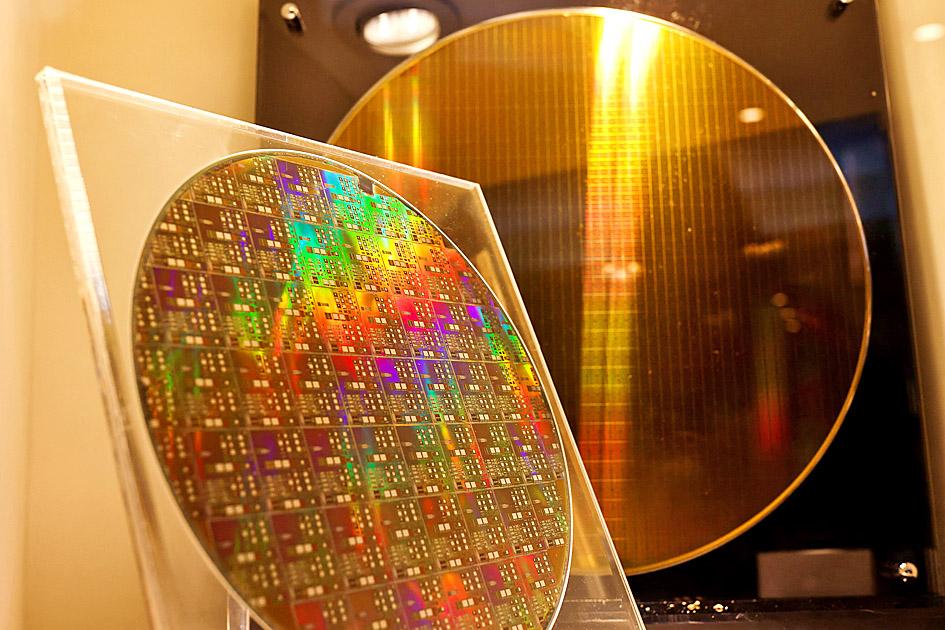The Industrial Technology Research Institute (ITRI, 工研院) yesterday raised its growth forecast for Taiwan’s semiconductor industry, expecting production value to expand about 19.4 percent to NT$4.88 trillion (US$164.24 billion) this year, primarily aided by stronger growth from foundry companies amid a chip crunch.
That means the output of Taiwan’s semiconductor industry would again outpace that of its global peers, which collectively are expected to grow 10.4 percent this year, ITRI said.
The institute three months ago estimated that the production value of the nation’s semiconductor industry would grow 17.7 percent annually to NT$4.81 trillion this year, compared with NT$4.08 trillion last year.

Photo: Ann Wang, Reuters
The production value of the foundry sector, the biggest contributor to the industry, is expected to grow 28 percent to top NT$2.49 trillion this year, compared with an earlier estimate of 24 percent expansion, the institute said.
Taiwan Semiconductor Manufacturing Co (TSMC, 台積電), the world’s biggest foundry service provider, yesterday posted record revenue of NT$172.56 billion for last month, surging 55 percent annually and up 0.3 percent monthly.
That brought TSMC’s revenue in the first four months of this year to NT$663.64 billion, soaring 40.1 percent from NT$473.73 billion in the same period last year.
Powerchip Semiconductor Manufacturing Corp (力積電), which primarily makes display driver and power management ICs, reported revenue last month surged about 48 percent year-on-year to a record NT$7.33 billion, with cumulative revenue in the first four months jumping 54.14 percent to NT$28.04 billion.
Production value at chip designers, the second-biggest contributor to the nation’s semiconductor industry, are expected to climb 14 percent annually to NT$1.38 trillion this year, the institute said.
Handset chip designer MediaTek Inc (聯發科) reported that revenue increased 43.89 percent annually to NT$52.63 billion last month, the second-largest monthly level in the firm’s history.
Revenue in the four-month period totaled NT$195.34 billion, up 35.08 percent year-on-year, the company said.
ITRI said that local chip testers’ production value would grow 9.6 percent annually to NT$222.5 billion this year, higher than its February estimate of an 8.4 percent rise to NT$220 billion.
However, memorychip makers’ production value would rise 7.6 percent to NT$309.8 billion this year, a downward revision from its February prediction of a 10.7 percent increase to NT$318.8 billion, it said.

To many, Tatu City on the outskirts of Nairobi looks like a success. The first city entirely built by a private company to be operational in east Africa, with about 25,000 people living and working there, it accounts for about two-thirds of all foreign investment in Kenya. Its low-tax status has attracted more than 100 businesses including Heineken, coffee brand Dormans, and the biggest call-center and cold-chain transport firms in the region. However, to some local politicians, Tatu City has looked more like a target for extortion. A parade of governors have demanded land worth millions of dollars in exchange

An Indonesian animated movie is smashing regional box office records and could be set for wider success as it prepares to open beyond the Southeast Asian archipelago’s silver screens. Jumbo — a film based on the adventures of main character, Don, a large orphaned Indonesian boy facing bullying at school — last month became the highest-grossing Southeast Asian animated film, raking in more than US$8 million. Released at the end of March to coincide with the Eid holidays after the Islamic fasting month of Ramadan, the movie has hit 8 million ticket sales, the third-highest in Indonesian cinema history, Film

Taiwan Semiconductor Manufacturing Co’s (TSMC, 台積電) revenue jumped 48 percent last month, underscoring how electronics firms scrambled to acquire essential components before global tariffs took effect. The main chipmaker for Apple Inc and Nvidia Corp reported monthly sales of NT$349.6 billion (US$11.6 billion). That compares with the average analysts’ estimate for a 38 percent rise in second-quarter revenue. US President Donald Trump’s trade war is prompting economists to retool GDP forecasts worldwide, casting doubt over the outlook for everything from iPhone demand to computing and datacenter construction. However, TSMC — a barometer for global tech spending given its central role in the

Alchip Technologies Ltd (世芯), an application-specific integrated circuit (ASIC) designer specializing in server chips, expects revenue to decline this year due to sagging demand for 5-nanometer artificial intelligence (AI) chips from a North America-based major customer, a company executive said yesterday. That would be the first contraction in revenue for Alchip as it has been enjoying strong revenue growth over the past few years, benefiting from cloud-service providers’ moves to reduce dependence on Nvidia Corp’s expensive AI chips by building their own AI accelerator by outsourcing chip design. The 5-nanometer chip was supposed to be a new growth engine as the lifecycle